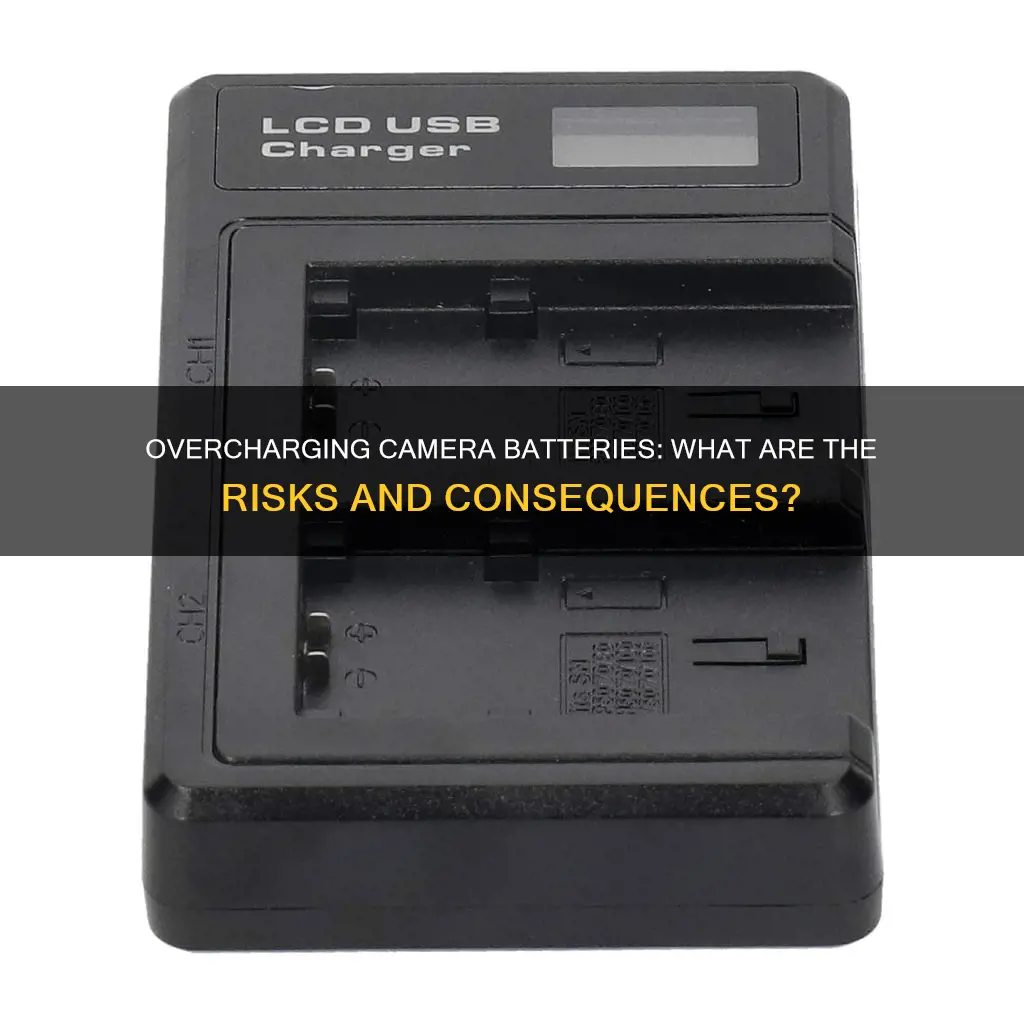
Overcharging a camera battery can have several negative consequences. While most modern camera batteries are designed to stop charging automatically when they reach full capacity, keeping the battery in its charger for an extended period can cause damage and reduce its performance and lifespan. This is due to the heat generated by the charger, which can cause the battery to produce excess heat and, in some cases, explode or catch fire. To prevent overcharging, it is important to use a compatible charger and follow the manufacturer's recommendations for charging time and voltage. Additionally, regular battery check-ups and proper maintenance can help extend the life of your camera battery.
What You'll Learn
- Overcharging can cause a camera battery to produce excess heat and explode
- Keeping a battery in its charger for too long can reduce its lifespan
- Overcharging can cause the electrolyte in a battery to heat up and evaporate
- Overcharging can cause a battery to swell, melt, leak, or emit smoke
- Using the wrong charger can cause a battery to overheat and explode

Overcharging can cause a camera battery to produce excess heat and explode
Overcharging a camera battery can have serious consequences, and it's important to understand the risks to avoid any potential hazards. While modern camera batteries often have built-in protections to prevent overcharging, it's still a good practice to follow proper charging practices and battery maintenance routines.
When a battery is overcharged, it continues to receive electrical energy even after reaching its full capacity. This excess energy can cause the electrolyte inside the battery to heat up and evaporate, leading to a condition known as
To prevent overcharging, it's crucial to use the correct type of charger that is compatible with your specific camera battery. Smart chargers, for example, are designed to monitor the battery's voltage and adjust the charging rate accordingly. Additionally, always follow the manufacturer's recommendations for charging time and voltage to ensure you don't overcharge your battery.
It's worth noting that even if your camera battery has built-in overcharge protection, keeping it in the charger for extended periods can still reduce its lifespan. This is because chargers produce heat, and high temperatures are known to gradually degrade battery performance. Therefore, it's recommended to remove the battery from the charger once it has reached a full charge.
By following proper charging practices and maintaining your camera battery, you can help ensure its longevity and safety. Remember to store your battery at a cool temperature, avoid complete discharge, and regularly check for any signs of damage or leakage. Taking these precautions will help you avoid the potential risks associated with overcharging and keep your camera equipment in optimal condition.
The Best Ways to Store Camera Batteries
You may want to see also

Keeping a battery in its charger for too long can reduce its lifespan
Lithium-ion batteries, which are commonly used in cameras, have improved safety features and are less prone to overcharging compared to older battery types. The built-in protection circuits monitor the battery's voltage and temperature, and when it reaches its maximum charge level, the circuit automatically stops the charging process. This helps to prevent overcharging and ensures the longevity and safety of the battery.
However, it's important to note that no battery is completely immune to overcharging. Leaving a battery in the charger for too long can cause damage that will reduce the performance and service life of the battery. This is because the battery will begin to self-discharge, and the charger will kick in and recharge the battery to full capacity. Keeping the battery at or close to 100% capacity can reduce battery performance and life, as the high voltage will stress the battery.
Additionally, chargers produce heat, and high temperatures are known to gradually reduce battery life. Therefore, it is recommended to store batteries at around 15°C (59°F) and to avoid charging them in extreme temperatures.
To maximise the lifespan of your camera battery, remove the battery from the charger once it has completed recharging. It is also important to use the charger provided by the camera manufacturer or a reputable third-party charger specifically designed for your camera battery.
Charging Your ADT Camera Battery: A Step-by-Step Guide
You may want to see also

Overcharging can cause the electrolyte in a battery to heat up and evaporate
Overcharging a camera battery can have several negative consequences, including a reduction in battery performance and lifespan. While modern camera batteries often include overcharge protection, which automatically stops charging when the battery reaches full capacity, leaving the battery in the charger can still cause damage due to the heat generated by the charger. This is especially true if the battery is left charging overnight or for extended periods.
Now, let's focus on the electrolyte in a battery and what happens when it overheats due to overcharging:
Overheating Electrolyte:
The electrolyte in a battery is a critical component that enables the battery to provide power to devices. It is typically a solution or substance that facilitates the movement of electrically charged ions between the cathode (positive terminal) and the anode (negative terminal) of the battery. This movement of ions creates an electrical current, allowing the battery to power devices.
Heating Up and Evaporating:
When a battery is overcharged, the electrolyte can heat up and evaporate. This happens because overcharging results in an excess of electrical current passing through the electrolyte, generating heat. The heat can cause the electrolyte to boil, leading to a significant increase in temperature and pressure inside the battery. This increase in temperature and pressure can have several detrimental effects:
- Boiling of Electrolyte: The heat generated by overcharging can cause the electrolyte to boil, leading to the creation of flammable gases and an increase in pressure within the battery. This pressure buildup can lead to the battery casing deforming or even exploding.
- Reduction in Battery Performance: Keeping the battery at or close to full charge due to overcharging can stress the battery with high voltage, reducing its performance and lifespan.
- Safety Hazards: In severe cases, the flammable gases created by boiling the electrolyte can ignite, leading to a battery explosion or fire. This can pose a significant safety hazard, as evidenced by incidents like the Samsung Galaxy Note 7 battery recalls and the London house fire caused by a charging camera battery.
- Permanent Damage: Overheating the electrolyte can cause permanent damage to the battery's internal components, reducing its capacity and overall lifespan.
- Inefficient Charging and Discharging: The electrolyte plays a crucial role in converting stored energy into usable electrical energy during the charging and discharging cycles. When the electrolyte heats up and evaporates, it affects the efficiency of this energy conversion process, impacting the battery's performance.
Camera Charger Problems: De-A11 Edition
You may want to see also

Overcharging can cause a battery to swell, melt, leak, or emit smoke
Overcharging a camera battery can have several negative consequences, including reducing the battery's lifespan and causing physical damage to the battery, such as swelling, melting, leaking, or emitting smoke.
When a battery is overcharged, it can produce excess heat, which can lead to the battery drying out and losing its ability to hold a charge. The electrolyte inside the battery may heat up and evaporate, causing the battery to swell and, in some cases, melt. This can also result in leakage, as the increased pressure and heat can cause the battery casing to crack or rupture. In extreme cases, overcharging can even lead to thermal runaway, a chain reaction that can cause the battery to explode or catch fire.
Additionally, overcharging can impact the battery's lifespan by damaging its internal components. The excess heat generated during overcharging can further accelerate the degradation of the battery, reducing its overall lifespan.
To prevent these issues, it is important to use the correct charger for your battery and follow the manufacturer's recommendations for charging time and voltage. Most modern camera batteries have built-in overcharge protection, which automatically stops charging when the battery reaches full capacity. However, leaving the battery in the charger for extended periods can still cause damage due to the heat generated by the charger. Therefore, it is advisable to remove the battery from the charger once it has completed recharging.
In summary, overcharging a camera battery can lead to a range of issues, from reduced battery lifespan to physical damage, including swelling, melting, and leaking. Taking proper charging precautions and regularly maintaining your battery can help prevent these issues and ensure the safety and longevity of your camera equipment.
Camera Batteries: Do They Have an Expiry Date?
You may want to see also

Using the wrong charger can cause a battery to overheat and explode
Using the wrong charger for your camera battery can have serious consequences. While modern camera batteries are designed with overcharge protection, using a mismatched charger can cause the battery to overheat and, in rare cases, explode.
Lithium-ion (Li-ion) batteries, which are commonly used in cameras, can be safely recharged even if they are not fully exhausted. These batteries are designed to stop charging automatically once they reach full capacity, preventing overcharging. However, if a charger that is not designed for your specific battery is used, it may not have the necessary overcharge protection, and the battery may continue to charge beyond its capacity.
When a Li-ion battery is overcharged, it can generate excessive heat, which boils the acid inside the battery. This boiling acid creates a flammable gas and increases the pressure inside the battery. If the pressure becomes too high, the battery can explode, sending metal and acid flying. Additionally, the flammable gas created by the boiling acid can be ignited by a spark, leading to an explosion or fire.
To avoid these potential dangers, it is crucial to always use the correct charger for your camera battery. Using a mismatched charger can bypass the built-in safety features of the battery and charger, leading to a potentially dangerous situation. By using the charger that came with your camera or a compatible charger from a reputable source, you can help ensure the safety and longevity of your battery.
While modern camera batteries have rigorous safety testing and protection mechanisms in place, it is still important to follow best practices for battery care. This includes removing the battery from the charger once it has reached full charge, storing it at cool temperatures, and avoiding complete drainage before recharging. By taking these precautions and using the appropriate charger, you can help prevent overheating and reduce the risk of explosion or fire.
Cleaning Camera Battery Contacts: A Step-by-Step Guide
You may want to see also
Frequently asked questions
Overcharging is when a battery is charged beyond its full capacity. This can be caused by a faulty battery charger, improper usage, or other issues with the charging system.
Overcharging a camera battery can lead to several issues. In the best-case scenario, the battery will lose some of its capacity. In the worst-case scenario, the battery will overheat, swell, and explode or start a fire. Overcharging can also reduce the lifespan of the battery, as it can damage the battery's internal components.
Some signs of an overcharged battery include swelling or bulging, leakage around the battery terminals, decreased electrolyte levels, and the battery becoming hot to the touch.
To prevent overcharging, use a charger that is compatible with your battery and follow the manufacturer's recommendations for charging time and voltage. Remove the battery from the charger once it has reached full charge, and store it at a cool temperature.







